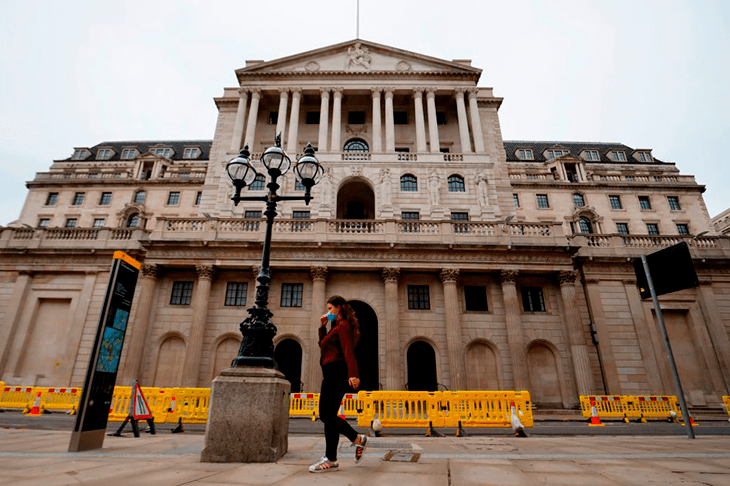The FTSE-100 index of leading stocks is over 20 per cent up since Britain went into lockdown — ‘bull market’ territory. The government borrowed £55 billion in May, nine times more than the same month last year — yet borrowing costs are down, with some investors now paying to lend to an increasingly indebted nation.
Who cares if the UK economy will shrink some 10 per cent this year, as our national debt rockets above 100 per cent of GDP? Stocks are up, bond prices are up and the laws of economics have been suspended. It’s different this time — and all because of quantitative easing.
Back in 2009, with the global banking system on the brink of collapse, QE was a justifiable emergency measure. But this one-off post-crisis necessity has now morphed into a lifestyle choice. For a decade since the financial crisis, QE has pumped up share prices and suppressed bond yields, allowing governments to borrow cheaply. But as state spending has surged post-Covid, we’ve become dependent. QE is now the economic equivalent of crack cocaine.
Originally a £50 billion temporary rescue plan, the Bank of England — egged on by City financiers and high-spending politicians — expanded QE over ten years to around £450 billion. Since March, it has ballooned again, into a £745 billion binge, with our central bank now buying government debt twice as fast as in 2009/10.
The combined balance sheet of the Federal Reserve, the European Central Bank and the Bank of Japan has similarly swollen since Covid, by a third over the past three months. So QE is no problem — everyone’s doing it!
Much of our political and media class has indeed concluded that interest rates are low, and will stay low, so governments can keep borrowing. ‘Debt service costs are manageable,’ is now part of the Westminster lingo. But what if the bond markets rebel and market interest rates spike, whatever the Bank of England says?
The immediate problem is that QE is deeply counterproductive. Hosing economies with liquidity doesn’t make them grow faster — that’s like trying to get fat by buying a bigger belt. Earning no interest on savings and being paid to borrow distorts basic economics. Central bank bond-buying has kept far too much capital locked up in over-indebted ‘zombie companies’ — resulting in low productivity.
This monetary excess has made financial investors more reckless, with markets losing their ability to ‘correct’ — witness sky-high valuations amid crashing growth. That’s astonishingly dangerous, setting us up for collapse.
Many ‘real-world’ investors, meanwhile — business owners and those taking direct stakes — have been so spooked by this monetary madness that they’ve kept money off the table, stymying growth even more.
QE hasn’t led to inflation, its acolytes say — and it won’t in the future. But it has. Much of the central bank’s ‘funny money’ has so far stayed within the financial system, generating stock and bond market bubbles, as well as bloating property prices. If bank lending now expands across the broader economy, as the government hopes, inflation will follow QE as night follows day.
By holding back bond vigilantes for now, QE is facilitating vast government debts that will come back to haunt us. Monetary policy is now so deranged that around a fifth of all global debt has a negative yield, retarding global growth and storing up huge systemic dangers. Amid already massive monetary expansion, the Westminster City consensus is that we need even more, as the Bank of England prepares to yank UK interest rates deep into negative territory.
Sterling is not a reserve currency and we have a huge trade deficit — this cannot end well. Our QE-stock-market-bond-market Ponzi scheme must be recognised for what it is.
We need to break our QE dependency — and encourage others to do the same. What’s needed is a retreat from this monetary frenzy, cooling financial markets in a bid to restore normality and balance as the post-Covid global economy reboots.






Comments